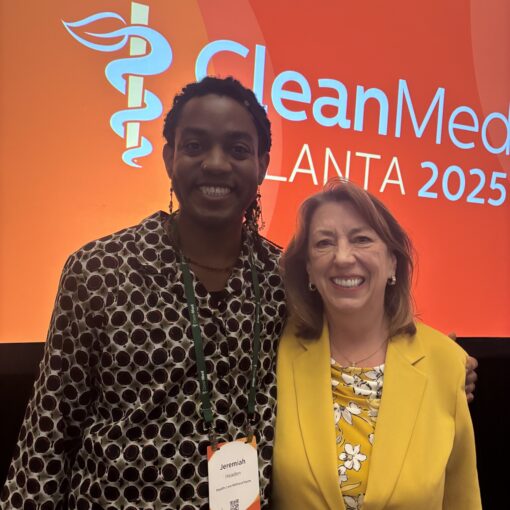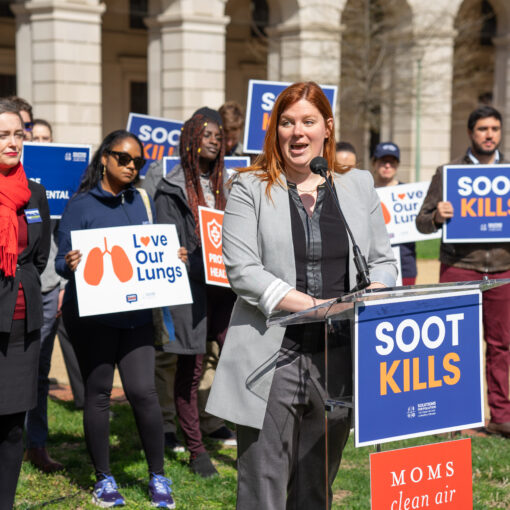If we look at addressing these challenges in tandem, the COVID-19 crisis provides useful guidance for addressing our climate emergency. The stimulus money we’re indebting ourselves with has the potential to go a long way to solving climate change. Comprehensive COVID and economic solutions with a longer-term perspective can lead us to climate solutions – a more prosperous, healthy, thriving and just America. It can reignite the true spirit of America’s leadership.
What have we learned from the COVID-19 pandemic?
- We can tackle monumental challenges: The most important lesson overall is that we can muster society, the policies, and the financial resources to quickly address problems of significant importance – namely our climate emergency. Once leadership listened to the experts and understood the implications of the COVID-19 pandemic, the U.S. acted with extraordinary speed and scale. Congress aligned and mustered up a $2 trillion action plan to address the immediate health and economic implications in less than two weeks. Climate solutions would actually cost less and provide greater benefits.
- Timing Matters: With COVID-19, quick action by health and governmental officials in places like Singapore “flattened the curve” whereas delayed action, by mere weeks, in places like Italy and the United States has resulted in explosive outbreak and death rates. The longer we wait to put our shoulders behind mitigating and preparing the climate emergency, the more it will cost us both in lives and livelihoods.
- Crises highlight injustices in society: COVID-19 is shining a light on the health, economic, societal, and racial inequities embedded in our society. Wealthy folk can comfortably self-quarantine in their large homes, their vacation homes – some on their yachts. The disadvantaged amongst us face far higher health risks, can’t work from home, and can least afford the economic harms of losing their jobs and health care. This is a moral challenge and responsibility.
- Preparation Matters: Countries like South Korea that were prepared with good public health systems and pandemic-trained professionals ready with testing, protection, and treatment equipment and supplies, have had much lower COVID-19 incidence and much quicker recovery than we’ve had in America. We must prepare for climate change with similar mastery. One idea is a U.S. Recovery Authority charged with foreseeing and preparing for calamities.
- Science and Facts Matter: Trust in experts and science has been critical for the successes in COVID-19 response and public welfare. Many political leaders in places like Italy, the U.K. and the U.S. did not listen to experts, believing their naive judgement of the situation was better. Leaders and professionals who took the science seriously and acted accordingly are saving thousands of lives. We need our society and leaders to wake up to the importance of science, facts and climate realities; the existential threats and the opportunities.
- Leadership Matters: Chief executives are the people who can act in the moment and make a difference. With COVID-19, prime ministers, presidents, governors, and mayors who made the right decisions and acted promptly reduced impacts. We need our leaders to step up and champion the information, plans, and resources to effectively address climate change.
- Transparency and Honesty Matter: Labeling the coronavirus an emergency as such has triggered historic national and worldwide collaboration and action. But when political leaders and the media bury the facts, they have distracted people and organizations from action, and driven up morbidity and mortality and a myriad of individual and societal injustices.
- Individuals Matter: Most Americans are self-quarantining and many are making room to care for and connect with others beyond their own families. They are providing moral outrage that is forcing government to act with people as a priority. Their individual and collective actions have made government realize that social welfare is a primary responsibility.
Of course, there are many questions still unanswered about COVID-19 and our responses to it. How long will it last? Will there be a second wave, perhaps larger than the initial pandemic, next year? Can we develop immunities, or vaccines, or treatments that will protect us? What will we learn from this pandemic? How can we “multi-solve” and address health, climate, and equity issues with COVID-19 solutions? How will we mitigate the possibility of and prepare for future crises? The next pandemic might have significantly higher morbidity and mortality rates than COVID-19. And climate change will assuredly have even greater impacts if left unaddressed.
We will establish a new normal post COVID-19, and it can be better or worse for us. This virus is causing us to change almost everything we do – how we work, connect, travel, shop, go to school, go to church, and more. We hit the pause buttons on our everyday lives, but certainly not the snooze button. In many ways we are awakening and thrust into new ways of being, punctuating the equilibrium of the past.
We’re in the middle of the story and can write our own ending. There are certainties that can guide our action. We are interconnected, interdependent and empowered to multi-solve. Here are a few guiding principles for addressing climate change.
- Act and react with empathy and kindness: In our personal interactions, in our communities, and with our policy solutions, we need to treat others, especially the less fortunate, as we would like to be treated if we were in their shoes. We need to build a more personal and a much broader sense of equity and justice to our climate work. Listen well to both optimize your efforts and help others adjust.
- Keep equity at the core of our responses: Start with people. Listen to and work from their priorities. Prioritize housing, make school lunch programs available for at-home learning, shore up public health, create work opportunities, build shared, sustainable prosperity.
- Base our decisions on facts, science and experts: Political and financial interests are experts in propaganda. They obfuscate facts, and confuse and misdirect the public to line their pockets with our money, while increasing harms to the rest of us. The facts, science, and experts should guide all our decisions.
- Inspire, empower and take action: People won’t act on any issue if they think it won’t impact them or they can’t make a difference anyway. As with COVID-19, the exact opposite is true with climate change. We all need to lean in and move our families, workplaces, congregations, communities and the country toward effective climate mitigation, restoration and justice. Show up for others. Donate to food banks, help neighbors get groceries, help folks apply for economic assistance and press government at all levels for regenerative solutions.
- Elect good leadership: Primary to solving COVID-19 is leadership that puts the well-being of Americans as an essential priority. Dishonest, ineffective leadership exacerbates problems and increases harm. The most critical thing we can do to address climate change is elect people who understand and will take the necessary measures to do so.
- Communicate & Collaborate: We actually have at hand all the money, technology, and policy solutions we need to address climate change. As a recent PNAS article highlighted, what we need is a social tipping point. Activists alone are not enough – we need to reach out through our spheres of influence to motivate others to act, and to act together for climate solutions.
- Capitalize on the moment: Social disruptions open space for rapid, massive social change. By structuring solutions to crises in ways that multi-solve for other issues, we can create self-reinforcing benefit. We need to realize that we and our problems are interconnected and interdependent, and so are the solutions. We must all embrace our critical role as advocates.
This guidance is a work in process. There’s a lot to learn from our compound crises and sharing learning will help us get through them. We welcome your thoughts and recommendations and will use this to guide ecoAmerica’s climate work. Thank you for your input and partnership in this vision.





